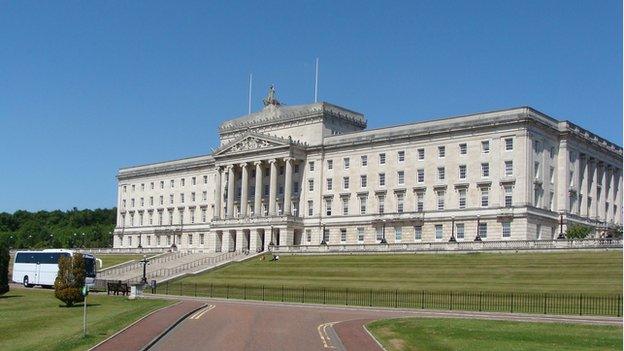Treasury warned Northern Ireland Executive 'to go into red'
- Published

Stormont faces a shortfall of more than £200m in its budget for the current financial year
The Treasury has been formally warned that the Northern Ireland Executive is on track to go into the red by the end of this financial year.
The Treasury was contacted by the head of the Northern Ireland Civil Service.
It comes as executive ministers have proved unable to resolve the deadlock over welfare reform and other financial pressures.
Stormont faces a shortfall of more than £200m in its budget for the current financial year, which ends in April.
'Serious situation'
This consists of just under £90m in fines imposed by the Treasury due to the executive's failure to implement welfare reforms introduced elsewhere in the UK and more than £100m in other inescapable pressures.
A Treasury spokesperson said: "Setting budgets for Northern Ireland departments is a matter for the Northern Ireland Executive. As with the other devolved administrations, it is for the executive to determine how to manage within the existing allocations set by the Treasury."
The warning was welcomed by the first minister and DUP leader Peter Robinson, who blamed Sinn Féin for the problem and said a "serious situation" was evolving that could have consequences for the health service.
It is understood that executive ministers are planning an 'away day' on Tuesday, and possibly Wednesday as well, to try to resolve their differences.
The head of the civil service, Dr Malcolm McKibbin, is the official responsible for certifying that Stormont balances its books.
'Solvable'
With no end in sight to the arguments over welfare reform, he has now written to the permanent secretary at the Treasury, Sir Nicholas Macpherson, to warn the government he believes Stormont is on course to breach its spending limits.
How the Treasury might respond is unclear, it could take any overspend off next year's allocation or change the way they currently fund the executive.
Ministers are expected to meet again next week to discuss the budgetary crisis, but there is no immediate sign of a way forward acceptable to both the DUP and Sinn Féin.
Stormont Finance Minister Simon Hamilton of the DUP told the BBC: "It is undoubtedly a very serious situation but it is solvable if the parties, particularly Sinn Féin, sit down with a sense of reality about the situation to deal properly with the pressures we are facing this year, and discuss and agree a draft budget for next year."
Education Minister John O'Dowd of Sinn Féin said: "We will continue to involve ourselves in discussions around those matters and we will work our way through this as best we can, but the welfare bill has to be brought before the assembly."